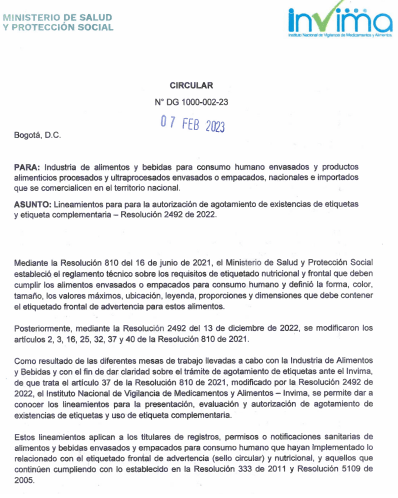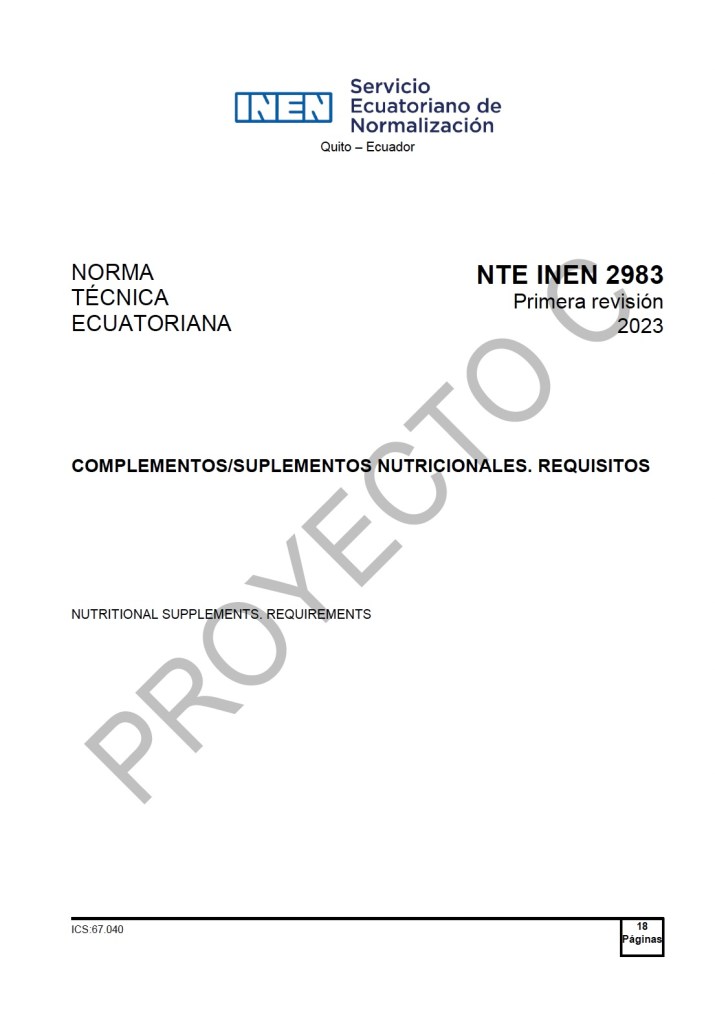Questions about the safety of food additives and their consumption have been raised in recent years. The increased exposure to these substances, either by intake of ultra-processed foods or by the broad use and combination of various categories of additives, may be related to higher risks to consumer health. This article comments on the results of a study that quantified and characterized food additives found on the labels of 9,856 packaged foods and beverages available in Brazilian supermarkets. The study adopted a field diary method to record and analyze nonconformities in the lists of ingredients. The objective of this article is to discuss the use of additives identified on the labels and the limitations of Brazilian legislation, which should guarantee the right to information and health.
Day: 21/02/2023
Colombia – Exhaustion of labels according to Resolution 2492 of 2022
Through resolution 810 of June 16, 2021, the Ministry of Health and Social Protection established the nutritional and front labeling requirements that canned or packaged foods for human consumption must comply with, defining the shape, color, size, maximum values, location, legend, proportions and dimensions that must be contained.
After this, by means of resolution 2492 of December 13, 2022, some articles were modified and as a result of different work tables, in order to process the exhaustion of labels before the National Institute of. Surveillance of Medicines and. Food (INVIMA in Spanish) modifying article 37, the entity released the guidelines for the presentation, evaluation and authorization of label stock depletion and use of complementary labels.
INVIMA reminds that the process of label exhaustion according to resolution 2492 of 2022 can only be done until February 28th.

Brazil – MAPA approves new technical regulation on bacon identity and quality
The Ministry of Agriculture and Livestock (MAPA in Portuguese) published Ordinance No. 748 approving the revision of the Technical Regulation of Identity and Quality (RTIQ) of bacon for establishments and industries registered with the Federal Inspection Service (SIF) and the Brazilian System for the Inspection of Products of Animal Origin (Sisbi-POA). The rule is effective as of March 1 and repeals Annex II of Normative Instruction No. 21/2000.
Ecuador – Draft revisions and amendments to alcoholic beverage standards
The Ecuadorian Standardization Service (INEN) has published several draft standards on alcoholic beverages such as Whisky, Liquors, Fruit wine, Rum and Cocktails or mixed alcoholic beverages and aperitifs.
- NTE INEN 365 (Amendment 1). Alcoholic beverages. Whisky. Requirements. This standard establishes the requirements for whiskey to be considered fit for human consumption.
- NTE INEN 1837 (3rd revision). Alcoholic beverages. Liquors. Requirements. This standard establishes the requirements for liquors considered fit for human consumption.
- NTE INEN 374 (amendment 1). Alcoholic beverages. Fruit wine. Requirements. This standard establishes the requirements for fruit wine.
- NTE INEN 363 (amendment 1). Alcoholic beverages. Rum. Requirements. This standard establishes the requirements for rum considered fit for human consumption.
- NTE INEN 2802 (amendment 1). Alcoholic beverages. Cocktails or mixed alcoholic beverages and aperitifs. Requirements. This standard establishes the requirements for alcoholic beverages known as cocktails or mixed alcoholic beverages and aperitifs, both domestically produced and imported, that are marketed in the country.
Ecuador – Draft revised standard on dietary supplements
The Ecuadorian Standardization Service (INEN in Spanish) has published a draft revision of NTE INEN 2983 (1st Revision) Complementos/ suplementos nutricionales. Requirements. This standard establishes the requirements for nutritional complements/supplements. This standard does not apply to foods for special diets.
